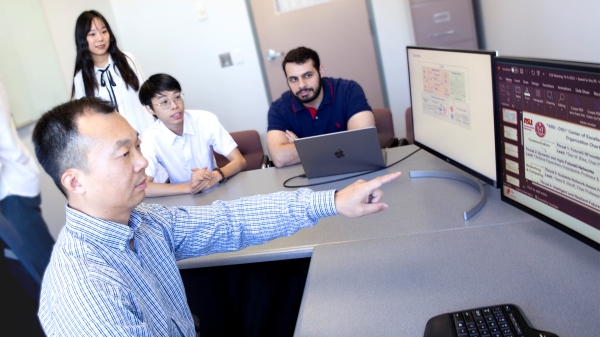ASU to join consortium aimed at increasing number, diversity of STEM students
Selection paves way for unique research, development opportunities
Arizona State University has been chosen as a Vertically Integrated Projects (VIP) site joining a multi-university consortium dedicated to increasing the number and diversity of college graduates in STEM fields while also improving graduation rates.
Made possible by a grant from the Leona M. and Harry B. Helmsley Charitable Trust, the VIP program takes a unique approach to involving students in STEM (science, technology, engineering and mathematics) studies by teaming undergraduates with seasoned faculty researchers engaged in long-term projects. This involvement, which extends over multiple semesters and provides academic credit, is intended to motivate the students to pursue STEM-based career fields. ASU’s participation in this program adds a new approach to the university’s portfolio of expanding research opportunities for undergraduate students, part of ASU’s continual innovation in delivering higher education and providing high-quality programs.
“This VIP award provides the kick-start for an initiative that we hope will be self-sustaining and integrated into many STEM majors at ASU,” says professor Carole Greenes, director of ASU’s PRIME Center. “Such academic-research integration provides opportunities for undergraduate students to engage in ongoing research and development in the working labs and centers of scientists and engineers to solve real-world problems. We hope this engagement excites students about graduate study and career opportunities in their chosen fields.”
Originally established at Georgia Tech more than a decade ago, the VIP Consortium has since grown to 20 universities that now include ASU. The ASU VIP program will be directed by Carole Greenes, ASU professor of mathematics and director of the Practice, Research, and Innovation in Mathematics Education (PRIME) Center, and co-directed by Robert Greenes, ASU professor of biomedical informatics and Carole's husband, and it will be based at ASU’s PRIME Center in the College of Liberal Arts and Sciences. The center seeks to expand the talents and interests of K-20 students in STEM and has formed alliances with colleges, schools and research centers throughout ASU.
“The Helmsley Charitable Trust is thrilled to support the VIP Consortium’s transformative approach to active learning,” said Ryan Kelsey, program officer at the trust. “It is very compelling to see such a range of engineering schools across the country that are ready to adopt large-scale, effective practices that we expect will retain more students, particular more women and students of color.”
Key benefits of the VIP Consortium include:
• Collaborative team-based research as an expanded education experience: As educational material is increasingly available online, the hands-on research experience of VIP provides a dimension to undergraduate education that is an ever-growing important part of the in-person learning environment that a university such as ASU can offer.
• Long-term research and development experiences: VIP selection extends the academic design, development and research experience for undergraduate students beyond a single semester, with opportunities to participate for up to three years. VIP provides the time and context to learn and practice professional skills, to make substantial contributions, and to experience different roles in large multidisciplinary design/discovery/research teams.
• Academic credits: Undergraduate VIP students earn academic credit every year, beginning as sophomores, while faculty and graduate students benefit from the contributions of their team members.
• Leadership and mentoring: The long-term nature of VIP creates a village environment with faculty and graduate students leading teams, experienced undergraduates mentoring new members, and students moving into leadership roles as others graduate.
• Enhanced faculty research programs: VIP attracts students from many disciplines and enables their participation in large-scale design/discovery/research projects, strengthening and expanding faculty research portfolios.
The Helmsley Charitable Trust’s Education Program aims to advance American economic competitiveness as well as individual social mobility. At the post-secondary level, it focuses on increasing the number and diversity of college graduates in STEM fields by improving persistence to graduation.
Written by Judy Keane
More Science and technology

Advanced packaging the next big thing in semiconductors — and no, we're not talking about boxes
Microchips are hot. The tiny bits of silicon are integral to 21st-century life because they power the smartphones we rely on,…

Securing the wireless spectrum
The number of devices using wireless communications networks for telephone calls, texting, data and more has grown from 336…

New interactive game educates children on heat safety
Ask A Biologist, a long-running K–12 educational outreach effort by the School of Life Sciences at Arizona State University, has…